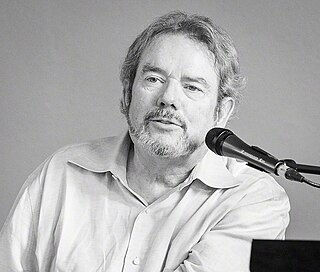
Jimmy Layne Webb is an American songwriter, composer, and singer. He achieved success at an early age, winning the Grammy Award for Song of the Year at the age of 21. During his career, he established himself as one of America's most successful and honored songwriter/composers.

Little Games is the fourth American album by the English rock band the Yardbirds. Recorded and released in 1967, it was their first album recorded after becoming a quartet with Jimmy Page as the sole guitarist and Chris Dreja switching to bass. It was also the only Yardbirds album produced by Mickie Most.

"Dazed and Confused" is a song written by American singer-songwriter Jake Holmes in 1967. Performed in a folk rock-style, he recorded it for his debut album "The Above Ground Sound" of Jake Holmes. Although some concluded that it was about a bad acid trip, Holmes insists the lyrics refer to the effects of a girl's indecision on ending a relationship.

Benefit is the third studio album by the British rock band Jethro Tull, released in April 1970. It was the first Tull album to include pianist and organist John Evan – though he was not yet considered a permanent member of the group – and the last to include bass guitarist Glenn Cornick, who was fired from the band upon completion of touring for the album. It was recorded at Morgan Studios, the same studio where the band recorded its previous album Stand Up; however, they experimented with more advanced recording techniques.

Having a Rave Up with the Yardbirds, or simply Having a Rave Up, is the second American album by the English rock group the Yardbirds. It was released in November 1965, eight months after Jeff Beck replaced Eric Clapton on guitar. It includes songs with both guitarists and reflects the group's blues rock roots and their early experimentations with psychedelic and hard rock. The title refers to the driving "rave up" arrangement the band used in several of their songs.

"MacArthur Park" is a song written by American singer-songwriter Jimmy Webb that was recorded first by Irish actor and singer Richard Harris in 1968. Harris's version peaked at number two on the Billboard Hot 100 chart and number four on the UK Singles Chart. "MacArthur Park" was subsequently covered by numerous artists, including a 1970 Grammy-winning version by country music singer Waylon Jennings and a number one Billboard Hot 100 disco version by Donna Summer in 1978. Webb won the 1969 Grammy Award for Best Arrangement Accompanying Vocalist(s) for the Richard Harris version.
"Babe I'm Gonna Leave You" is a folk song written by Anne Bredon in the late 1950s. Joan Baez, who learned the song from a student at Oberlin College, recorded the first published version for her 1962 album Joan Baez in Concert and a variety of musicians subsequently adapted it to a variety of styles, including the Association (1965), Quicksilver Messenger Service (1968), and Led Zeppelin (1969). Following the credit on Baez's 1962 release as "traditional, arranged by Baez", subsequent releases did not name Bredon until 1990 when, following Bredon's approach to Led Zeppelin, she received credit and royalties.
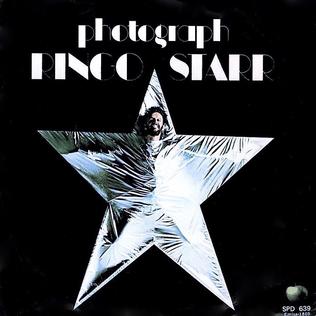
"Photograph" is a song by English rock musician Ringo Starr that was released as the lead single from his 1973 album Ringo. Starr co-wrote it with George Harrison, his former bandmate from the Beatles. Although they collaborated on other songs, it is the only one officially credited to the pair. A signature tune for Starr as a solo artist, "Photograph" was an international hit, topping singles charts in the United States, Canada and Australia, and receiving gold disc certification for US sales of 1 million. Music critics have similarly received the song favourably; Stephen Thomas Erlewine of AllMusic considers it to be "among the very best post-Beatles songs by any of the Fab Four".

"Shapes of Things" is a song by the English rock group the Yardbirds. With its Eastern-sounding, feedback-laden guitar solo and environmentalist, antiwar lyrics, several music writers have identified it as the first popular psychedelic rock song. It is built on musical elements contributed by several group members in three different recording studios in the US, and was the first Yardbirds composition to become a chart hit; when released as a single on 25 February 1966, the song reached number three in the UK and number eleven in the US.
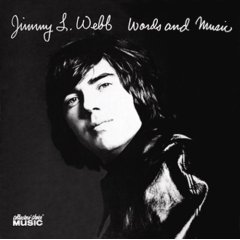
Words and Music is the second album by American singer-songwriter Jimmy Webb, released in 1970 by Reprise Records. This was the first album authorized by the artist.

Letters is the fourth album by American singer-songwriter Jimmy Webb, released in 1972 by Reprise Records. Letters was a more sedate, piano-oriented album than its predecessors, and soaked in the influence of Webb's peer and eventual close friend Joni Mitchell. "I was tremendously influenced by Joni Mitchell," he admitted to Peter Doggett of Record Collector in 1994. "She was a good friend, and I was fortunate enough to be around her when she was working on For the Roses and Court and Spark. We were just part of each other's lives for a while. I definitely envied that part of her work -- the idea that this is just a conversation you're listening in on. It can still be poetry, but not self-conscious or forced poetry. I got extremely under her spell as a writer -- I still am. I used to go to the studio and listen to her record, sit quietly in the back of the control room. After the Beatles, Joni was the next big blip on my radar screen, in terms of, 'Hey, pay attention: this girl is doing something a little bit different.'" Mitchell's longtime engineer Henry Lewy also did some engineering work for Letters as well.
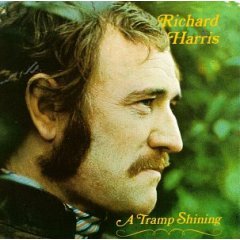
A Tramp Shining is the debut album of Richard Harris, released in 1968 by Dunhill Records. The album was written, arranged, and produced by singer-songwriter Jimmy Webb. Although Harris sang several numbers on the soundtrack album to the film musical Camelot the previous year, A Tramp Shining was Harris' first solo album. "MacArthur Park" was one of the biggest singles of that year, reaching number 2 on the Billboard Hot 100 chart in the United States. The album as a whole was also highly successful and was nominated for a Grammy Award for Album of the Year in 1969.
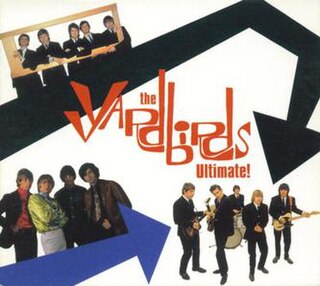
Ultimate! is a comprehensive career retrospective album by English rock group the Yardbirds. The 52-song two–compact disc compilation was released in 2001 by Rhino Records. The tracks span the period from the group's first demo recordings in 1963 to the last singles in 1968. They include all 17 of the group's singles, both A-side and B-sides, supplemented with more than a dozen album tracks, their performance for the film Blow-Up, and three early solo numbers by singer Keith Relf.
"I'm So Glad" is a Delta blues-style song originally recorded by American musician Skip James in 1931. Blues historian Gerard Herzhaft notes "This spiritual probably dates back to the beginning of the blues". Blues writer Stephen Calt describes it as "a Two-Step piece marked by fiendishly fast playing [in] an eight bar arrangement comprised of single measures." He adds it is not related to an earlier Lonnie Johnson tune. Paramount Records released James' "I'm So Glad" on the then standard 10-inch 78 rpm shellac phonograph record in 1931. It is included on various compilations as well as Hard Time Killing' Floor (2005), a complete collection of James' recordings on compact disc, by Yazoo Records. James' song has been recorded by early blues artists, including Fred McDowell.

Jim Webb Sings Jim Webb is the debut album by American singer-songwriter Jimmy Webb, released in 1968 on Epic Records.

"All I Know" is a song written by American songwriter Jimmy Webb, first recorded by Art Garfunkel on his 1973 debut solo album, Angel Clare, released by Columbia Records. Instrumental backing was provided by members of the Wrecking Crew, L.A. session musicians. Garfunkel's version is the best known and highest-charting version, peaking at number nine on the Billboard Hot 100 and number one on the Easy Listening chart for four weeks in October 1973. Garfunkel's version begins with a solo piano, before he begins to sing. When the orchestration is beginning to fade out, the solo piano takes over, playing melodic passages to the song's end.

"Didn't We" is a song recorded by Irish singer and actor Richard Harris for his debut studio album, A Tramp Shining (1968). It was written and produced by Jimmy Webb and originally served as the B-side to Harris' 1968 single "MacArthur Park". "Didn't We" was then distributed as the record's single by Dunhill Records, also in 1968. A traditional pop song, Harris sings about his life in the past. Commercially, it charted at lower positions of both the United States and Canada, and in the higher ranks of their Adult Contemporary component charts. Harris featured "Didn't We" on several of his greatest hits albums, including The Richard Harris Collection: His Greatest Performances from 1973. That same year, the song was reissued as a promotional single paired alongside his 1971 single "My Boy".

"Trapped" is a 1972 song written and recorded by reggae artist Jimmy Cliff and popularized by Bruce Springsteen in the 1980s.

"Skating Away on the Thin Ice of the New Day" is a song by British progressive rock band Jethro Tull. It was released on their album War Child in 1974. Written as a comment on global cooling for the band's aborted "Chateau D'isaster" album, the song was reworked in 1974 for War Child.
"Heavy Horses" is a song written by Ian Anderson and performed by his band Jethro Tull. The song was released on the 1978 album of the same name. Written as a tribute to horses, the song features folk rock elements that rebelled against the musical trends of the period.

















